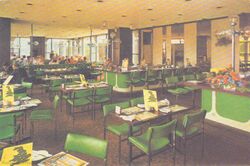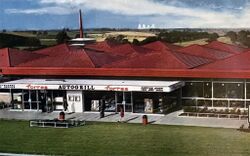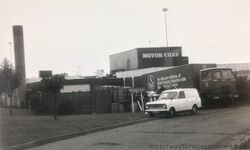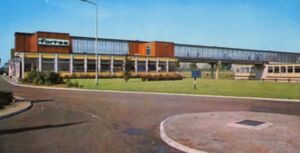Trusthouse Forte
| Locations: | up to 13 |
| Introduced: | 1960 |
| Removed: | 1986 (as a motorway brand) 1995 (as a brand owner) |
| Predecessors: | none |
| Successors: | Welcome Break |
Fortes (later Trusthouse Forte) were a hospitality giant and the leaders of the roadside market before being bought out by Granada. They owned hundreds of restaurants and planned many services. Before motorways, they ran many hotels and cafés around the country. Their first business was a milk bar in 1935.
Owing to their heritage as a hotel and restaurant chain, they took the catering at their services very seriously. While they weren't flawless, at a time when their competitors were struggling to serve anything edible, Fortes were usually considered "the best of a bad bunch".
History

Keen to promote their name, Fortes wanted to get involved in the motorway game from the start. They proposed designs for both Watford Gap and Newport Pagnell, focussing on providing the highest service that would show their name in a good light.
At Watford Gap, they were marginally pipped to the post by a more competitive tender, but at Newport Pagnell they won the contract and created a design which went on to be used as a benchmark across the country. The government spoke highly of them, but then Fortes had been offering to pay them a lot of rent as rent was based on turnover and Fortes were aiming for the highest end of the market. It wasn't a conspiracy, but it did give Fortes a head start in the early tendering processes.
Motorway Services Ltd
Fortes' first few services were actually operated by Motorway Services Ltd, a joint venture between Forte (92%) and Blue Star (8%). The latter were responsible for the fuel and recovery parts of the business, while Fortes took control of the catering and prestigious operation of the main site. The two paired up to ensure they had expertise in all areas of the industry, and to promote their two names.

This business name is perhaps the source of the linguistically unusual phrase "motorway services", even though both companies opted to use their own names publicly.
Motorway Services Ltd made strong bids for all the early services. Monopoly regulations prevented Motorway Services Ltd from bidding for Lancaster, so Forte did it under their own name and claimed they were an entirely new operator.
After struggles to open Keele and Charnock Richard, directors of Motorway Services Ltd opted to sit back for a while and instead Forte bid to operate services entirely by themselves while Blue Star found new partners.
Autogrill

Fortes Autogrill was the name used for some large Fortes restaurants, built besides major roads, such as at Peartree and Barnsdale Bar. These were based on the success of their motorway sites, and were soon brought under regular Fortes motorway branding.
Settling Down

Early Fortes services included an American-styled restaurant called Grill & Griddle, and in many cases, seating available along the bridge to provide a good view of the road. They then moved towards a Scandinavian theme, making heavy use of visible wood in their building designs. While Rank and Granada were desperate to win the early contracts, Fortes' efforts were considered to be consistent and patient.
In 1969 Fortes launched Post House, a chain of hotels which would later sit between the upmarket Forte Exclusive Hotels and the budget Forte Travelodge. Although Post House was generally separate from service areas, it would become one of Fortes's most famous brands.
Fortes went on to build several more services, before merging with Trust House in 1970. Trust House had been running inns and lodges since 1919, and the combined firm became Trust House Forte (later Trusthouse Forte).

This made Forte the UK's largest service area operator for the next 20 years. In 1976, they changed the name used by their services to Motor Chef. This was deliberately made very similar to Forte's Little Chef, as if the services were the bigger brother of the restaurants. This change was undone in 1979.
Lord Forte was very keen on the American principle of giving one operator a monopoly of the catering on an entire road. This doesn't really work with Britain's inflexible motorway network. Fortes became particularly frustrated with government taxes and briefly, in the 1970s, refused to build any more services. Instead, they considered a national network of motels and off-motorway lorry parks, which didn't go ahead.
In the early 1980s Forte introduced shops selling sandwiches and a few groceries, branded Piknics. Its logo was an umbrella. They replaced un-branded cafeterias with The Granary, Little Chef and Julie's. At this point their services had a green colour scheme, with slogans such as "a choice of good eating" and "the finest food on the motorway".
Brand Acquisitions
Having owned Little Chef since 1960, in 1986 Trusthouse Forte bought Happy Eater and the four Welcome Break services off Hanson Trust. They had been expecting the Welcome Break acquisition to have them referred to the Monopolies and Mergers Commission, but instead it was Happy Eater that did this. Despite acknowledging that Forte were dominating the roadside restaurant market, the purchase was approved.
At the time Trusthouse Forte described Welcome Break as 'highly respected', so they decided to re-brand all their motorway services as THF Welcome Break rather than do it the other way round (in reality, using the Welcome Break name meant Forte could distance their highly reputed brand from the notorious motorway market). This meant an end to Forte-branded services, but they continued to own Welcome Breaks and several other chains.
By now Forte and its brands were the only operator to be very satisfied with the way the government regulated motorway services, and were keen to open more, but had to wait for the Clacket Lane high court case to be completed. They introduced budget motels branded Forte Travelodge, which had a major influence on the hotel industry.
In 1993 they bought French operator Côté France from Granada.
Takeover
Sensing a forthcoming takeover, Trusthouse Forte needed to strengthen their business. They proposed the sale of Travelodge and all of their restaurants to Whitbread for £1 billion, arguing that their future was in the upmarket hotel sector. This was apparently agreed in 1995.
However before this could happen Granada were able to complete a hostile and controversial takeover, purchasing Trusthouse Forte for £3.9billion in 1995. Granada were critical of several areas of the Trusthouse Forte business, and shareholders believed Granada's management would be able to correct it. Their roadside services were described as being "tired" and "starved of money", but at the same time Granada argued that they wanted to cut costs. This would be achieved by engaging in economies of scale, and focusing on the most popular brands.
In addition, Granada sought to improve profits by raising their prices. They were soon forced to sell Welcome Break, who were picked up by Investcorp. The remaining Trusthouse Forte businesses were changed to become Forte.
When Compass and Granada split up (Compass took Granada's hospitality services and Granada kept their media), Forte was handed back to Charles Forte's son Sir Rocco Forte.
Locations
The following services were owned and branded as Fortes or Trusthouse Forte:
- Barnsdale Bar (A1)
- Burtonwood (M62)
- Charnock Richard (M6)
- Corley (M6)
- Fleet (M3)
- Gordano (M5)
- Grantham North (A1)
- Gretna Green (then-A74)
- Keele (M6)
- London Gateway (M1)
- Newport Pagnell (M1)
- Peartree (then-A34/A43)
- Woodall (M1)
Unbuilt services
The following services were planned by Fortes but they were never built. It was noted that, at times, Fortes had a habit of coming second in everything they bid for:
- Almondsbury - a private proposal from Motorway Services Ltd
- Aust
- Chigwell (M11) - Fortes won but pulled out
- Forton (M6)
- Heston (M4)
- Knebworth Park (A1(M))
- Knutsford (M6) - by Motorway Services Ltd
- Leicester Forest East (M1)
- Medway (M2) - by Motorway Services Ltd
- Milton Keynes lorry park (M1)
- Rownhams (M27)
- Toddington (M1)
- Watford Gap (M1)

